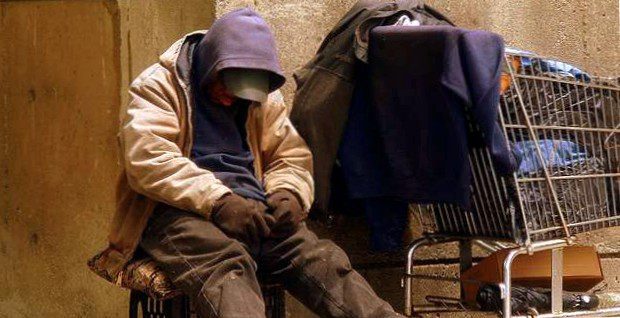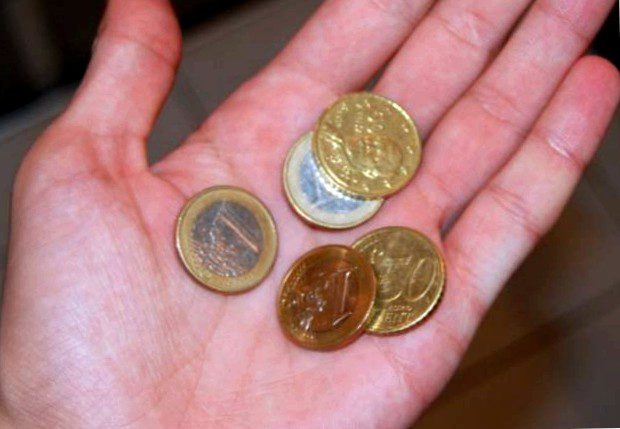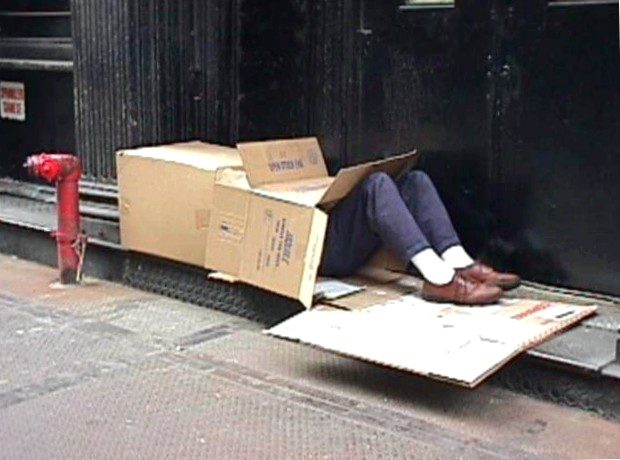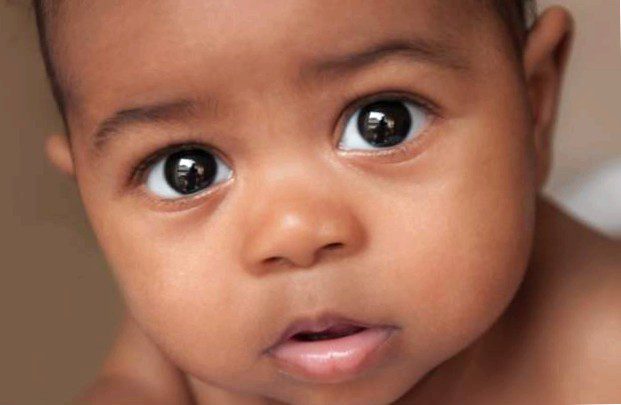
It's kind of a no-brainer that poverty sucks – if it totally rocked, no one would ever get a job. But most of us probably don't know how objectively horrific it is to be poor. At least we do not know yet. According to research, about 80 percent of Americans will suffer at least one year of poverty in their lifetime.
10 Chronic disease

If we're unkind, our image of the poor probably consists of junk food addicts moving through Walmart, smoking a cigarette and vaguely remembering when they last exercised. But this picture has almost nothing to do with reality. A long-term Gallup study found that people living in poverty are just as likely to eat healthy as the rest of us, just a little less likely to exercise, and they're also more educated about nutrition. If you're poor, however, your risk for chronic disease increases at a stupid rate.
Here are some numbers. If you're poor, you're almost twice as likely to be depressed. You are much more likely to suffer from asthma or diabetes, and you are more likely to suffer a heart attack. Once your income falls below a certain level, you statistically open yourself up to a variety of potentially life-threatening conditions. Unsurprisingly, this can take its toll.
9 early death

Here's an unpleasant statistic: If you're poor, you'll die an average of five years earlier than anyone else. If that doesn't sound so bad, you're probably having this read to you by a fleet of butlers on your luxury yacht. Five years makes a real difference, and it gets worse when you realize that not even the poorest in society, such as the homeless, are talking about it. It's just people living in poverty. The U.S. government defines less than 22.000 US dollars per year for a family of four.
But wait, it gets worse. Poverty in the United States is not evenly distributed. In fact, it tends to cluster around certain geographic areas. The result is that life expectancy, viewed at the county level, is getting even worse. In some poorer areas of the South, men have a life expectancy of less than 65 years old. This is lower than Nicaragua (70), Colombia (74), Guatemala (66), and on par with North Korea. In case anyone needs reminding, Guatemala has a murder rate comparable to most war zones. This is nothing to be proud of.
8 Low social mobility

High social mobility is a good thing. This allows us to have a middle class, aspirations to have. This prevents us all from being the faceless serfs of a group of upper class parasites. It encourages innovation, hard work and competition – and we seem to want to destroy it completely.
Right now, if you were born poor in the U.S. or the U.K., you stay poor. In both countries, social mobility is the worst in the Western world. Australians and Canadians have almost twice our level. Being born in the UK means there's a 30 percent chance you'll stay there. In the U.S., that's 42 percent. That is, poverty is statistically a life sentence. Would you like to know why the so-called underclass lacks aspiration? That's because our society has taken literally everything it can strive for.
7 Working poverty

When we talk about an underclass, we talk about "welfare queens". You've probably heard the term – it refers to people who live on government benefits without having to worry in the world. And while it is certainly true that there are lazy people in all strata of society, the vast majority of people seeking handouts are either in work or too young to work at all.
Take food stamps, a form of welfare that nearly 50 million Americans demand. Want to guess what percentage of recipients are too young or too old to work? Fifty-five percent of half of food stamps are for children or the elderly. Well, what about working households? They get 41 percent of the pie. In other words, almost everyone who receives this form of support is already in work or spends all day in kindergarten. In the U.K., a paltry 93 percent of those eligible for housing assistance hold jobs to survive. In short, modern poverty means worrying about feeding your family without a chance to improve your lot, and asking the government for money when your children are starving.
6 hungry children

In terms of child poverty, where do you think the U.S. would position itself relative to, say, Canada, Europe and Australia? Maybe at the top? Somewhere in the middle?
Try at the bottom. Earlier this year, the United Nations ranked 35 developed nations by child poverty, and the U.S. reached 34. Only in Romania is there a higher percentage of children living in poverty, and then not much. The result of all this misery? Hunger-constant, gnawing hunger for 17 million American children. And hungry kids don't tend to be healthy, happy kids. At the moment, a phenomenon known as "kindergarten dropout" is spreading. These are poor, often malnourished children struggling with "toxic stress" at an age when most of us still believe that if we close our eyes, we will disappear. This leads to psychological problems, obesity, depression and a significant reduction in life opportunities. Basically, these children are born poor and hungry, lead a short, stressful life and then die poor and hungry. It's a vicious cycle, and we're not doing anything to fix it.
5 move

Because of the tendency for poverty to cluster in certain areas, whether you opt out of low-income or no-income work may depend only on where you live.Take Atlanta – the city has a higher than average unemployment rate and some of the lowest social mobility in the country. Or how about Yuma, Arizona, where the unemployment rate is higher than it was during the Great Depression? If you are a low-income worker in one of these cities, you have a choice, stay and remain in poverty or move and try to find a better job.
That sounds easy, until you remember that moving is expensive. Let's assume you are in Atlanta. If you want to move there with lower unemployment and higher social mobility, you've written off most of the South. Moving interstate costs stupid money and there's no guarantee of a job when you get there – and that's if you can save enough for the deposit on your new house or rent in the first place. Basically, you're in a geographic poverty trap unless you play for life, which could mean spending the next three years explaining to your kids why they're both hungry and living in a car. Unfortunately, this scenario is not as crazy as you might think.
4 Homelessness

Here's the problem with writing an article about something like poverty – most of us don't care about it. Not because we are heartless, but because we rarely have enough personal experience to get an accurate picture of what it's like. So here's a little fact that it may be getting closer to homelessness among the upper middle class.
The double whammy is that homelessness as a whole is actually going down. But the number of people who are "unsheltered" – without a home but living in a car or on couches, for example – is increasing. This is significant in that the middle class tends to experience the "real" alleys and heroin types of homelessness. They tend to lose their homes, then pile into their cars or tour the homes of their relatives across the country. But just because they're not yet congregating under the underpasses doesn't mean the problem is any less acute. These are people who 38.Have earned $000 a year or more, lived in the suburbs, sent their kids to school, probably graduated, and generally look forward to a great life. And now they have to watch their dreams fade and their children grow up in poverty.
3 Lifetime debt

Now it feels like the whole world is drowning in debt. Governments are being destroyed by borrowing costs, people are struggling to pay off their credit cards, and things are looking pretty bleak. Unless you are on the lower end of the social scale. In this case, they look completely apocalyptic.
Take student loans – currently, one-third are either late or in default due to the recession that many graduates can't get. This results in hard working parents having the money and interest automatically deducted from their salary, which means more middle class families are pushed into poverty. But those are just the ones reaching sled rows for the first time. Those already at the bottom are often trapped in cycles of endless debt, thanks to unscrupulous lenders who act like better-dressed loan sharks. Because of the way interest rates work on these loans, people often have to take out other loans to cover their payments – and so on and so forth until they die.
2 Loss of human rights

Human rights are supposed to be universal. That's why they are called "human rights," not "rich men's rights" or "Donald Trump's rights". But all the evidence shows that when your income falls below a certain level, those supposedly universal rights simply disappear.
All you have to do is look at debtors' prisons – a throwback to the Victorian era where we incarcerate people who are too poor to pay off their debts. They are illegal because they create a never-ending cycle of poverty for those incarcerated. And in April of this year, Ohio was found guilty of imprisoning poor people without trial. But in prison, unlike some major U.S. cities, you can get clean water. A 2011 UN report found that the extreme poor in places like Sacramento, Los Angeles and Gainesville were routinely denied access to clean drinking water – something that shouldn't be possible in a modern, prosperous democracy. To be clear, the refusal of people to make clean water breaks so many international conventions that those responsible have now been taken to the ICC. But that's the problem with the very poor – there's not much they can do about it.
1 Infant mortality

If you want a depressing truth about modern poverty, it doesn't get much more depressing than this. Children born into poor families are simply more likely to die than their rich counterparts. Not easily more likely more likely more likely. According to a recent study, poor mothers with less than 12 years of schooling are 41 percent more likely to see their children die than their wealthier, better-educated counterparts, 41 percent. That's an impossible difference – the kind of numbers that are out of whack that you might suspect are missing a decimal point. No such luck. Modern poverty can not only destroy your soul, career prospects and health, but also take your children from you. If there is a single statistic more disgusting, depressing and shameful than this, we don't want to hear about it.
Morris is a freelance writer and newly trained teacher who still naively hopes to change the lives of his students. You can send your helpful and not so helpful comments to his email or visit some of the other sites that inexplicably hire him.